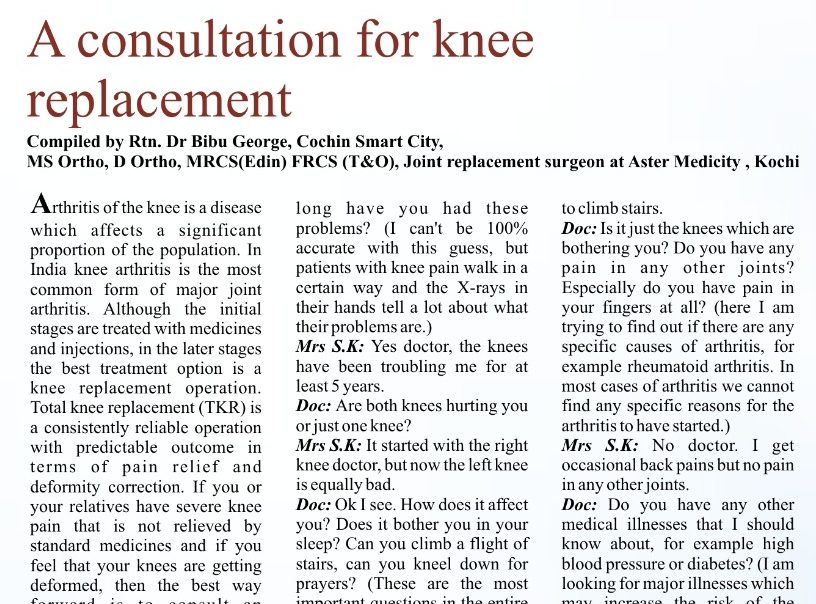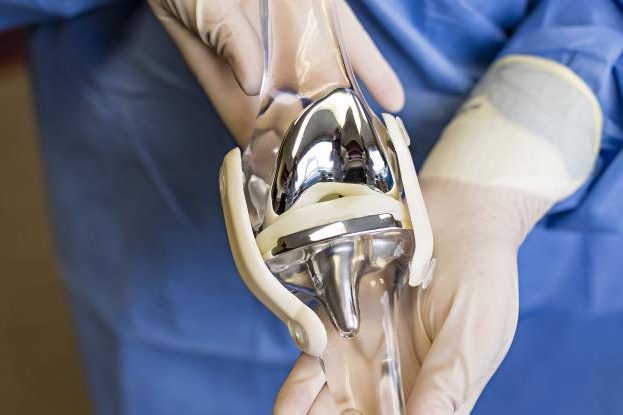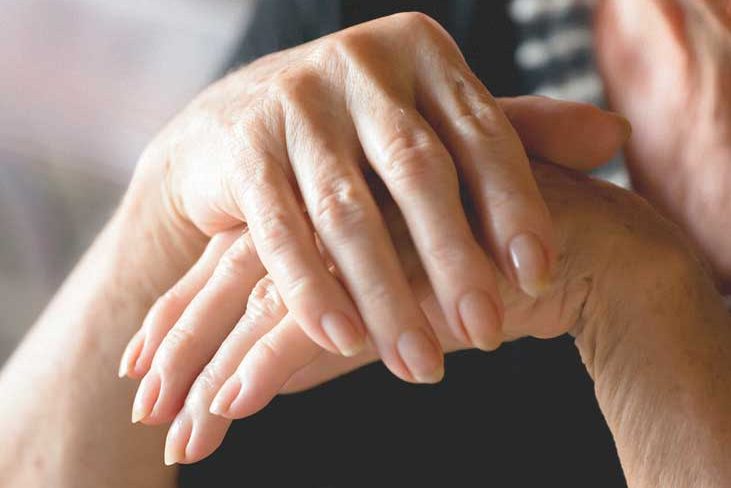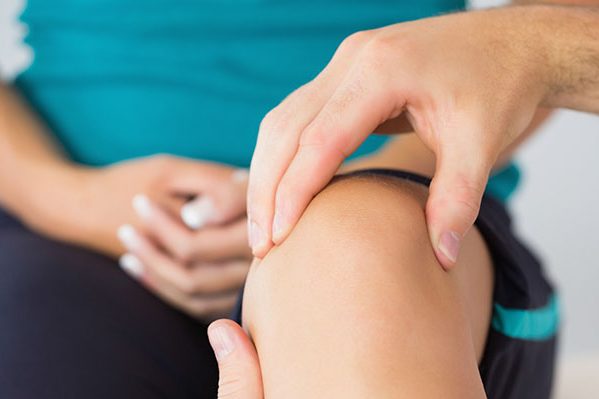
Compiled for the Cochin Smart City magazine.
Arthritis of the knee is a disease which affects a significant proportion of the population. In India knee arthritis is the most common form of major joint arthritis. Although the initial stages are treated with medicines and injections, in the later stages the best treatment option is a knee replacement operation Total knee replacement (TKR) is a consistently reliable operation with predictable outcome in terms of pain relief and deformity correction. If you or your relatives have severe knee pain that is not relieved by standard medicines and if you feel that your knees are getting deformed, then the best way forward is to consult an orthopedician to see if a knee replacement is appropriate for you. Even in this age of Internet and Google searches and Whats App forwards, a consultation with your doctor remains the best way to decide on major treatment options
Over the many years of clinical practice, I have noticed that most patients will have a certain set of standard doubts and clarifications that they require to make decisions regarding a knee replacement. I will try to present most of these doubts and clarifications in the format of a consultation with a knee replacement surgeon.
Doc: What brings you to the hospital today? It seems to me that you are having severe trouble with your knees. How long have you had these problems? (I can’t be 100% accurate with this guess, but patients with knee pain walk in a certain way and the X-rays in their hands tell a lot about what their problems are.)
Mrs S.K: Yes doctor, the knees have been troubling me for at least 5 years
Doc: Are both knees hurting you or just one knee?
Mrs S.K: It started with the right knee doctor, but now the left knee is equally bad
Doc: Ok I see. How does it affect you? Does it bother you in your sleep? Can you climb a flight of stairs, can you kneel down for prayers? (These are the most important questions in the entire consultation, these questions decide whether the person requires an operation or not. If they can do these activities of daily living without much trouble then they are unlikely to require an operation…)
Mrs S.K: Yes doctor. The knee pain is so severe that I cannot sit on the floor. The pain often bothers me at night and I wake up because of the pain and it has become nearly impossible for me to climb stairs.
Doc: Is it just the knees which are bothering you? Do you have any pain in any other joints? Especially do you have pain in your fingers at all? (Here I am trying to find out if there are any specific causes of arthritis, for example rheumatoid arthritis. In most cases of arthritis we cannot find any specific reasons for the arthritis to have started.)
Mrs S.K: No doctor. I get occasional back pains but no pain in any other joints.
Doc: Do you have any other medical illnesses that I should know about, for example high blood pressure or diabetes? (I am looking for major illnesses which may increase the risk of the surgery)
Mrs S.K: Yes doctor, I have high blood pressure and diabetes but I take tablets for both and they are well controlled now.
Doc: Ok, I need to have a look at your knees now. Can you get on the that examination table for me please? (Here I examine the patient thoroughly. I make a note of the deformities, pulses, other joints nearby and the skin condition. I also look at how much knee bending has been lost) Ok, I have seen your knees now, can I have a look at the X rays that you have brought here? (I look at the X-rays which usually confirms my diagnosis of osteoarthritis of the knee, it also tells me about how much cartilage has been lost and how much bone has been lost due to wear and tear. Usually for making a decision on knee replacement I do not need any other investigations other than the X-rays. CT scans and MRI scans are almost always unnecessary.) Ok, I think it is fairly straight forward as to what is happening with your knees here. The pain and the deformity of your knees are because of osteoarthritis, or in more normal language it is because of the wear and tear of your knee cartilage.
Mrs S.K: Ok Doctor, the previous doctor had also told us the same. Can you show me where the wear and tear is?
(I point to the part of the X-Ray, where the bone has come into contact with each other)
Mrs S.K: Ok, we understand doctor. What is the solution to my problem?
Doc: Given the severity of the arthritis and the fact that it has been affecting you for so long now, I would recommend considering a knee replacement surgery in this situation
Mrs S.K: Ok doctor, the previous doctor also recommended the same. That is why we have come today. We would like to know more. (Usually this is what happens, patients have heard about knee replacements, and they want to consider it, but want confirmation of the same from someone who does a lot of knee replacements and also to get as much information as possible before taking the plunge.)
Doc: OK I will tell you a little bit in detail about knee replacement surgery. (I deliver kind of a monologue here, this I tell almost all patients in the same words.) Knee replacement is a very good operation for your particular situation. We do it regularly here but it is not a small operation. The overall success rate of the operation is 90 to 95%. About 5% of people get small problems with the knee in the form of clicking or slight pain after your operation but it will still be much better than the pain you have now. It is a major operation and all major operations carry certain risks with it. With regards to knee replacement the risk of major complication is about 1%-2%. One of the main risk involved is the possibility of infection. Infection is an important risk that you should be aware of because if your knee replacement gets infected we may have to remove the implants completely to get rid of the infection. There are some risks associated with any major surgeries and anaesthesia which includes possibility of heart attacks, strokes, DVT and pulmonary embolism. These are rare complications but it is still not unheard of.
Mrs S.K: Doctor, we understand the risk of the operation but the pain in my knee is so severe that I am willing to consider the operation. How long do I have to stay in hospital and how long will the recovery period be?
Doc: Good question. Normally we would do all the necessary blood test, x rays, ECG and anaesthetic checkups at least a week before the operation. Operation is usually done on a Monday so you will have to get admitted one day prior to the operation. After the operation you will be made to stand up with the help of a Walker on the same day or at least on the next day morning. You will stay in hospital for 3 to 5 days depending on how fast you recover. It is unusual for you to stay for more than 5 days. At home you should be able to do most of your routine activities, ie you should be able to walk to the toilet, to the kitchen, and you should be able to sit at your dinner table for your food. Ideally you should have some help at home. Usually you will come back for stitch removal in 2 weeks time. At about six weeks I will see you once again in the outpatient department and take an X-ray to make sure everything is “in place”
Patient’s son: Doctor, we have heard about different kinds of implants. What kind of implants will you be using for our operation. (The question is about foreign vs Indian implants)
Doc: You might have heard about foreign implants and Indian implants. In our hospital we use only foreign implants. Although the cost of Indian made implants are lesser, the quality of those implants are not upto world standards yet. I almost always stick to one particular brand which seems to have the best results according to some of the medical literature.
Son: How much is the cost of the operation?
Doc: The total cost of the operation comes to about 2 to 2.5 lakh. The costliest item is the foreign imported implants
Son: That’s ok doctor. We would like to use the best available implant for our mother. What kind of anaesthesia will be used for the operation?
Doc: Usually it will either be a general anaesthetic or a spinal anaesthetic. The anaesthetics doctor will examine you thoroughly and decide which one is best for you.
At this stage we usually discuss dates for the operation and further tests and anaesthesia review
******




Compiled for the Cochin Smart City magazine. Arthritis of the knee is a disease which affects a significant proportion of the population. In India knee arthritis is the most common form of major joint arthritis. Although the initial stages are…
read more
A total knee replacement is a surgical procedure whereby the diseased knee joint is replaced with artificial material. The knee is a hinge joint which provides motion at the point where the thigh meets the lower leg. The thighbone (or…
read more
Osteoarthritis (OA) is one of the most common forms of arthritis. It is a chronic condition in which the material that cushions the joints, called cartilage, breaks down. This causes the bones to rub against each other, causing stiffness, pain…
read more
In a healthy knee, the ends of your thigh and shin bones are covered with hard cartilage which allows the bones to move easily against each other. Arthritis damages the hard cartilage so that it becomes thin. In places the…
read more